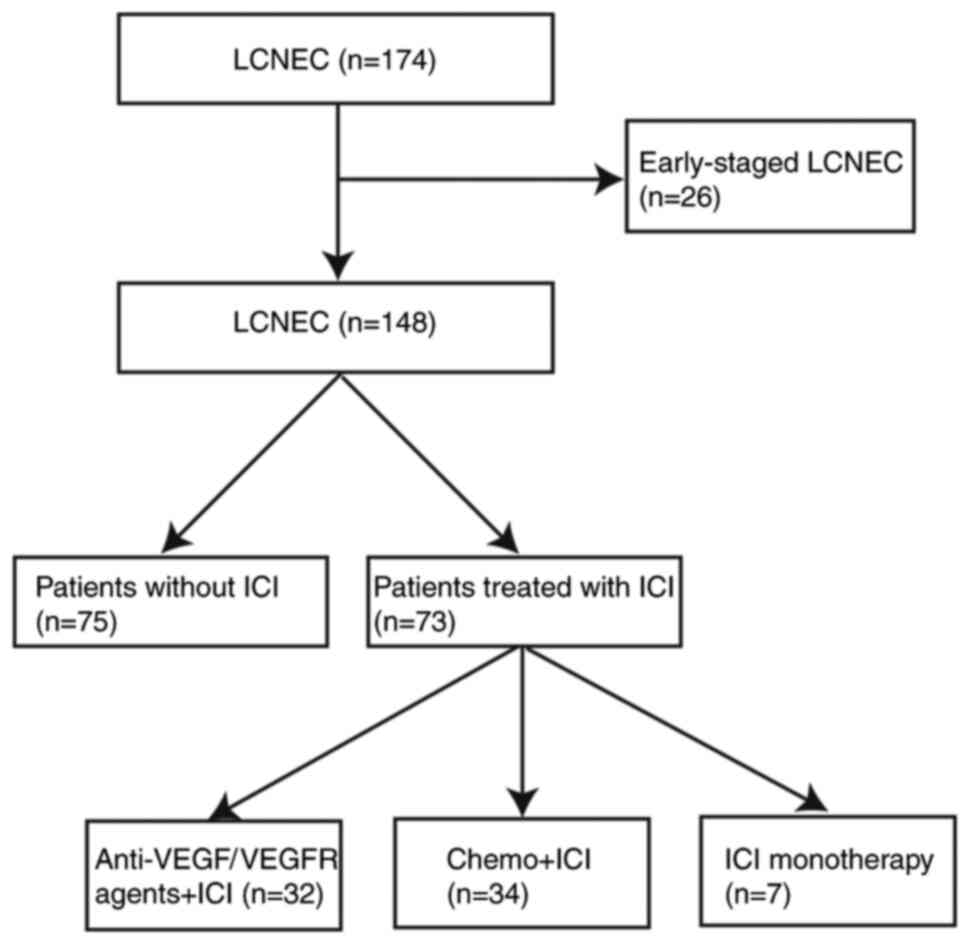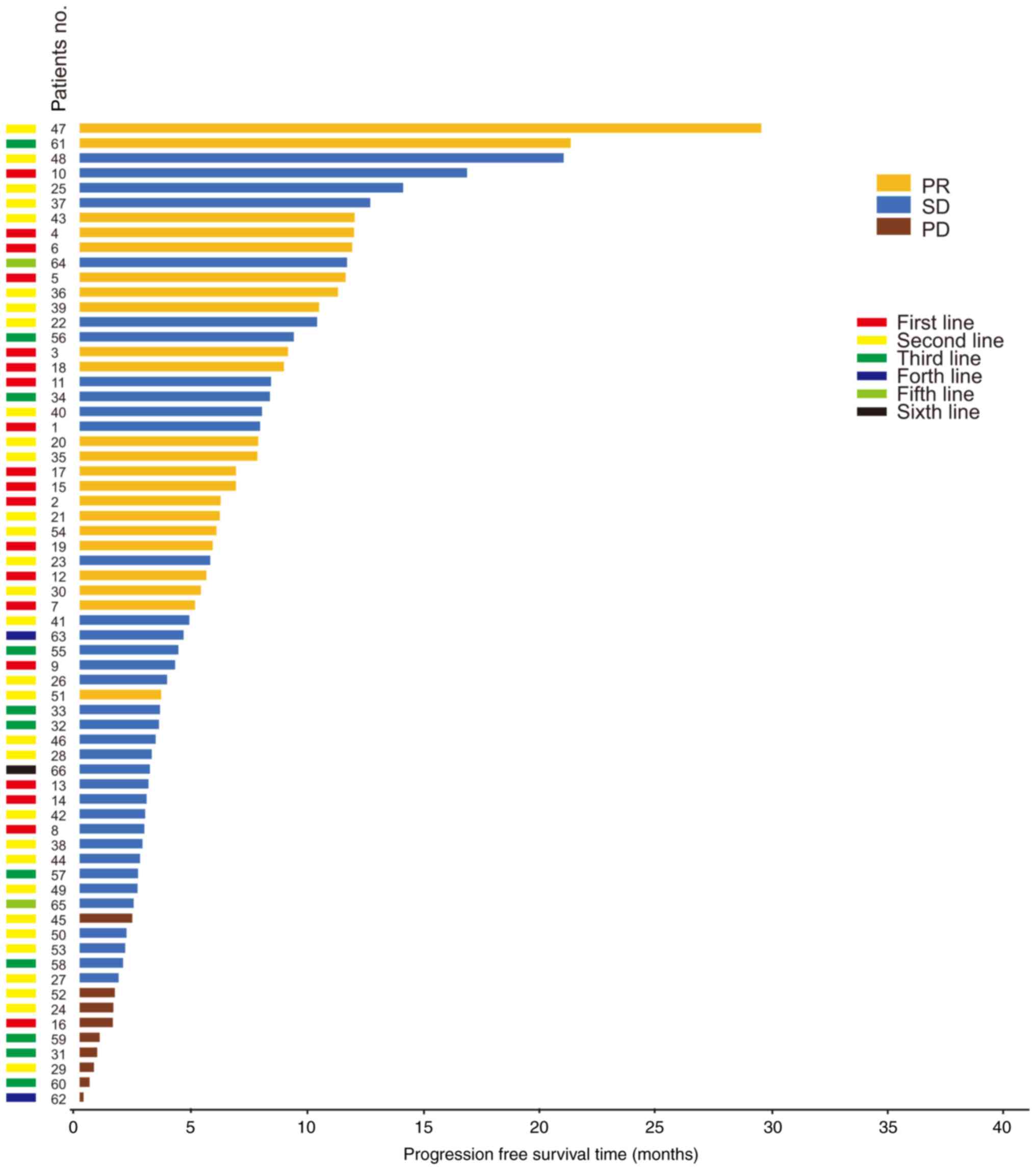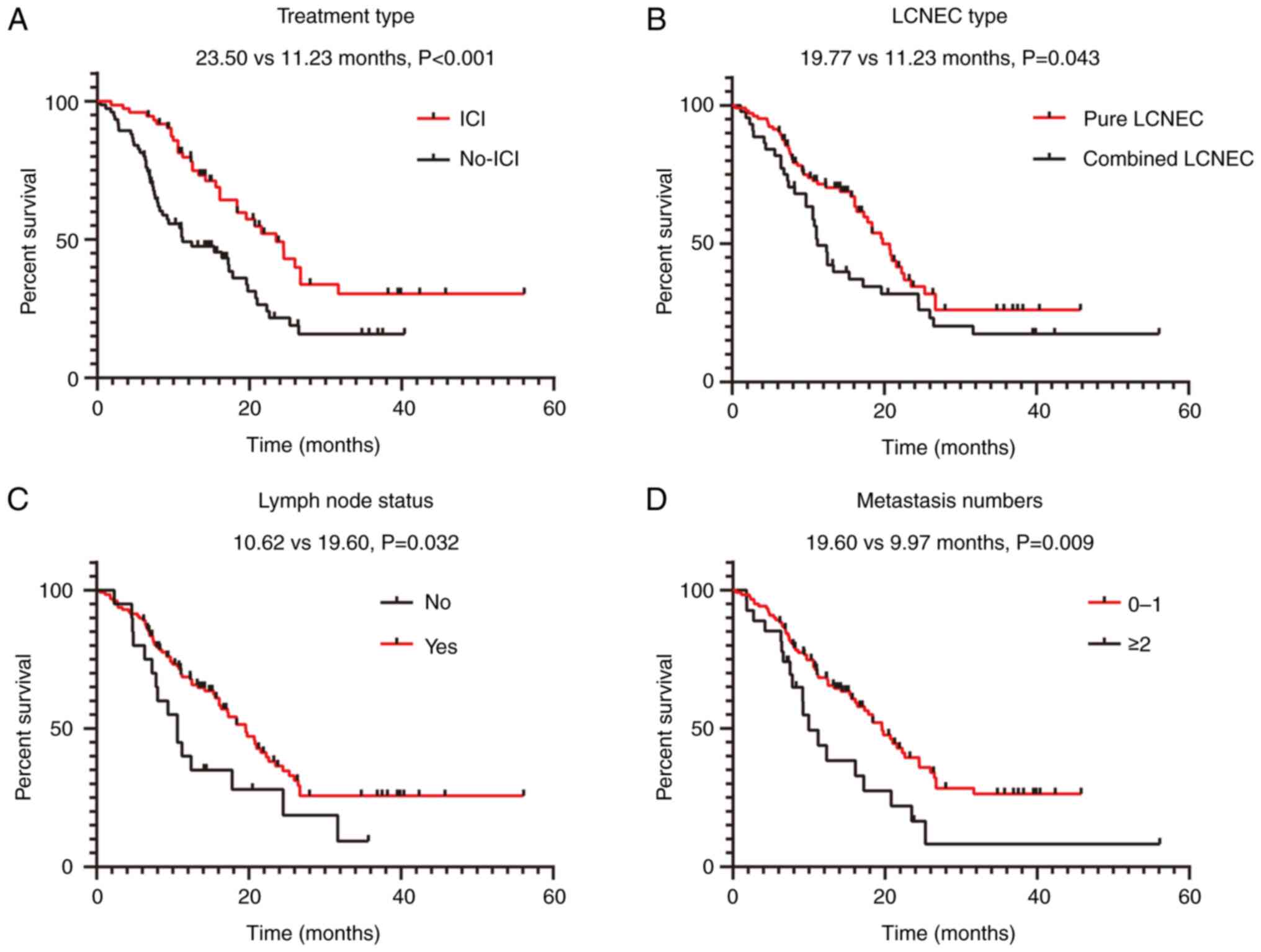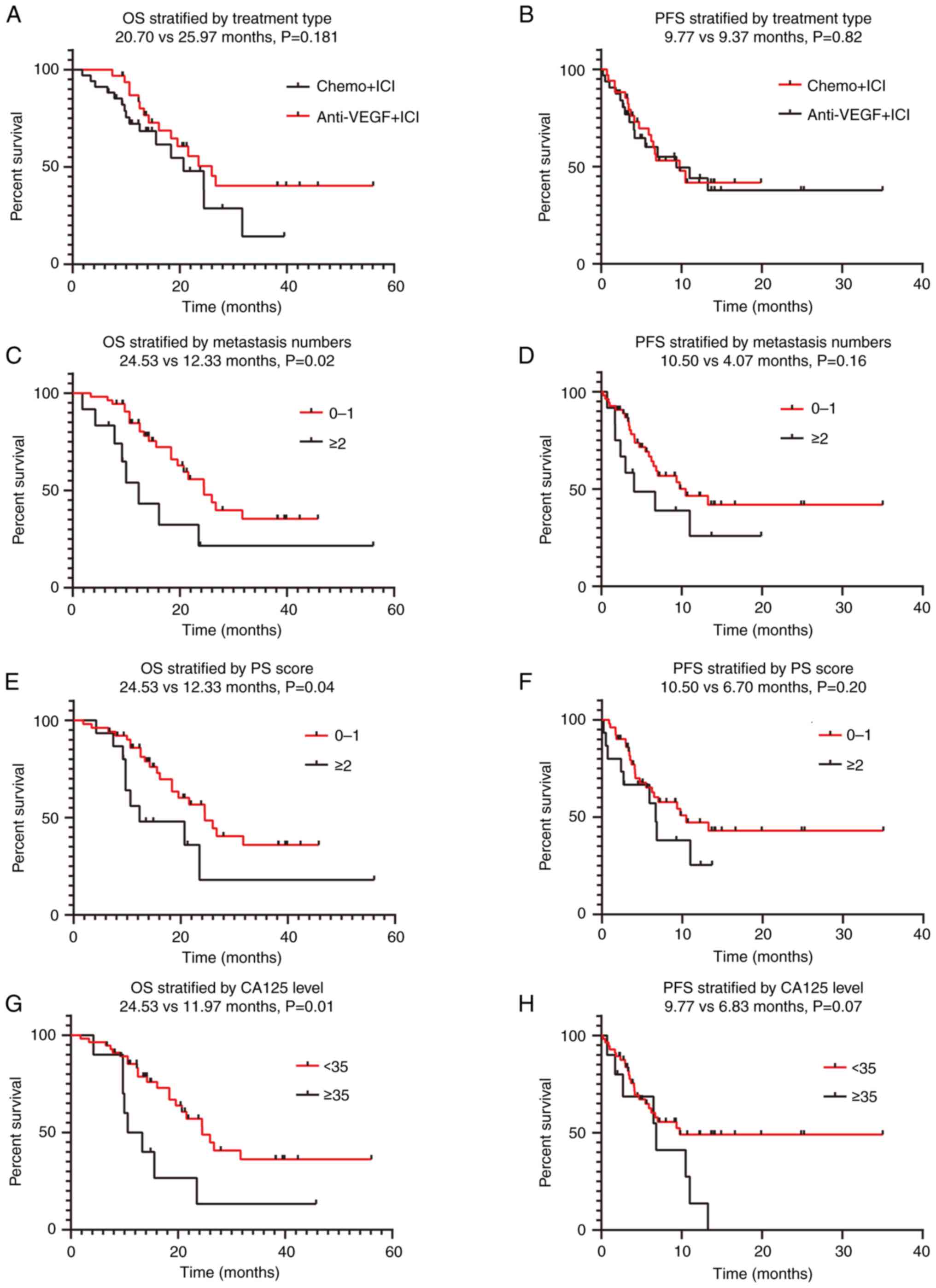|
1
|
Takei H, Asamura H, Maeshima A, Suzuki K,
Kondo H, Niki T, Yamada T, Tsuchiya R and Matsuno Y: Large cell
neuroendocrine carcinoma of the lung: A clinicopathologic study of
eighty-seven cases. J Thorac Cardiovasc Surg. 124:285–292. 2002.
View Article : Google Scholar : PubMed/NCBI
|
|
2
|
Iyoda A, Hiroshima K, Toyozaki T, Haga Y,
Fujisawa T and Ohwada H: Clinical characterization of pulmonary
large cell neuroendocrine carcinoma and large cell carcinoma with
neuroendocrine morphology. Cancer. 91:1992–2000. 2001. View Article : Google Scholar : PubMed/NCBI
|
|
3
|
Corbett V, Arnold S, Anthony L and Chauhan
A: Management of large cell neuroendocrine carcinoma. Front Oncol.
11:6531622021. View Article : Google Scholar : PubMed/NCBI
|
|
4
|
Andrini E, Marchese PV, De Biase D,
Mosconi C, Siepe G, Panzuto F, Ardizzoni A, Campana D and Lamberti
G: Large cell neuroendocrine carcinoma of the lung: Current
understanding and challenges. J Clin Med. 11:14612022. View Article : Google Scholar : PubMed/NCBI
|
|
5
|
Travis WD, Brambilla E, Nicholson AG,
Yatabe Y, Austin JHM, Beasley MB, Chirieac LR, Dacic S, Duhig E,
Flieder DB, et al: The 2015 World Health Organization
classification of lung tumors: Impact of genetic, clinical and
radiologic advances since the 2004 classification. J Thorac Oncol.
10:1243–1260. 2015. View Article : Google Scholar : PubMed/NCBI
|
|
6
|
Ferrara MG, Stefani A, Simbolo M, Pilotto
S, Martini M, Lococo F, Vita E, Chiappetta M, Cancellieri A,
D'Argento E, et al: Large cell Neuro-Endocrine carcinoma of the
lung: Current treatment options and potential future opportunities.
Front Oncol. 11:6502932021. View Article : Google Scholar : PubMed/NCBI
|
|
7
|
Rekhtman N, Pietanza MC, Hellmann MD,
Naidoo J, Arora A, Won H, Halpenny DF, Wang H, Tian SK, Litvak AM,
et al: Next-Generation sequencing of pulmonary large cell
neuroendocrine carcinoma reveals small cell carcinoma-like and
non-small cell carcinoma-like subsets. Clin Cancer Res.
22:3618–3629. 2016. View Article : Google Scholar : PubMed/NCBI
|
|
8
|
George J, Walter V, Peifer M, Alexandrov
LB, Seidel D, Leenders F, Maas L, Müller C, Dahmen I, Delhomme TM,
et al: Integrative genomic profiling of large-cell neuroendocrine
carcinomas reveals distinct subtypes of high-grade neuroendocrine
lung tumors. Nat Commun. 9:10482018. View Article : Google Scholar : PubMed/NCBI
|
|
9
|
Zhuo M, Guan Y, Yang X, Hong L, Wang Y, Li
Z, Chen R, Abbas HA, Chang L, Gong Y, et al: The prognostic and
therapeutic role of genomic subtyping by sequencing tumor or
cell-free DNA in pulmonary large-cell neuroendocrine carcinoma.
Clin Cancer Res. 26:892–901. 2020. View Article : Google Scholar : PubMed/NCBI
|
|
10
|
Postmus PE, Kerr KM, Oudkerk M, Senan S,
Waller DA, Vansteenkiste J, Escriu C and Peters S; ESMO Guidelines
Committee, : Early and locally advanced non-small-cell lung cancer
(NSCLC): ESMO Clinical Practice Guidelines for diagnosis, treatment
and follow-up. Ann Oncol. 28 (Suppl_4):iv1–iv21. 2017. View Article : Google Scholar : PubMed/NCBI
|
|
11
|
Welter S, Aigner C and Roesel C: The role
of surgery in high grade neuroendocrine tumours of the lung. J
Thorac Dis. 9 (Suppl 15):S1474–S1483. 2017. View Article : Google Scholar : PubMed/NCBI
|
|
12
|
Moon JY, Choi SH, Kim TH, Lee J, Pyo JH,
Kim YT, Lee SJ, Yoon HI, Cho J and Lee CG: Clinical features and
treatment outcomes of resected large cell neuroendocrine carcinoma
of the lung. Radiat Oncol J. 39:288–296. 2021. View Article : Google Scholar : PubMed/NCBI
|
|
13
|
Gu J, Gong D, Wang Y, Chi B, Zhang J, Hu S
and Min L: The demographic and treatment options for patients with
large cell neuroendocrine carcinoma of the lung. Cancer Med.
8:2979–2993. 2019. View Article : Google Scholar : PubMed/NCBI
|
|
14
|
Wakeam E, Adibfar A, Stokes S, Leighl NB,
Giuliani ME, Varghese TK Jr and Darling GE: Defining the role of
adjuvant therapy for early-stage large cell neuroendocrine
carcinoma. J Thorac Cardiovasc Surg. 159:2043–2054.e9. 2020.
View Article : Google Scholar : PubMed/NCBI
|
|
15
|
Iyoda A, Hiroshima K, Moriya Y, Takiguchi
Y, Sekine Y, Shibuya K, Iizasa T, Kimura H, Nakatani Y and Fujisawa
T: Prospective study of adjuvant chemotherapy for pulmonary large
cell neuroendocrine carcinoma. Ann Thorac Surg. 82:1802–1807. 2006.
View Article : Google Scholar : PubMed/NCBI
|
|
16
|
Zhang JT, Li Y, Yan LX, Zhu ZF, Dong XR,
Chu Q, Wu L, Zhang HM, Xu CW, Lin G, et al: Disparity in clinical
outcomes between pure and combined pulmonary large-cell
neuroendocrine carcinoma: A multi-center retrospective study. Lung
Cancer. 139:118–123. 2020. View Article : Google Scholar : PubMed/NCBI
|
|
17
|
Le Treut J, Sault MC, Lena H, Souquet PJ,
Vergnenegre A, Le Caer H, Berard H, Boffa S, Monnet I, Damotte D
and Chouaid C: Multicentre phase II study of Cisplatin-Etoposide
chemotherapy for advanced large-cell neuroendocrine lung carcinoma:
the GFPC 0302 study. Ann Oncol. 24:1548–1552. 2013. View Article : Google Scholar : PubMed/NCBI
|
|
18
|
Rossi G, Cavazza A, Marchioni A, Longo L,
Migaldi M, Sartori G, Bigiani N, Schirosi L, Casali C, Morandi U,
et al: Role of chemotherapy and the receptor tyrosine kinases KIT,
PDGFRalpha, PDGFRbeta, and Met in large-cell neuroendocrine
carcinoma of the lung. J Clin Oncol. 23:8774–8785. 2005. View Article : Google Scholar : PubMed/NCBI
|
|
19
|
Reck M, Rodriguez-Abreu D, Robinson AG,
Hui R, Csőszi T, Fülöp A, Gottfried M, Peled N, Tafreshi A, Cuffe
S, et al: Pembrolizumab versus chemotherapy for PD-L1-positive
non-small-cell lung cancer. N Engl J Med. 375:1823–1833. 2016.
View Article : Google Scholar : PubMed/NCBI
|
|
20
|
Hanna NH, Robinson AG, Temin S, Baker S,
Brahmer JR, Ellis PM, Gaspar LE, Haddad RY, Hesketh PJ, Jain D, et
al: Therapy for Stage IV non-small-cell lung cancer with driver
alterations: ASCO and OH (CCO) joint guideline update. J Clin
Oncol. 39:1040–1091. 2021. View Article : Google Scholar : PubMed/NCBI
|
|
21
|
Dudnik E, Kareff S, Moskovitz M, Kim C,
Liu SV, Lobachov A, Gottfried T, Urban D, Zer A, Rotem O, et al:
Real-world survival outcomes with immune checkpoint inhibitors in
large-cell neuroendocrine tumors of lung. J Immunother Cancer.
9:e0019992021. View Article : Google Scholar : PubMed/NCBI
|
|
22
|
Agar C, Geier M, Léveiller G, Lamy R,
Bizec JL, Tiercin M, Bernier C, Robinet G, Léna H, Ricordel C and
Corre R: Brief report on the efficacy of nivolumab in patients with
previously treated advanced large-cell neuroendocrine cancer of the
lung. JTO Clin Res Rep. 2:1001292021.PubMed/NCBI
|
|
23
|
Chauhan A, Arnold SM, Kolesar J, Thomas
HE, Evers M and Anthony L: Immune checkpoint inhibitors in large
cell neuroendocrine carcinoma: Current status. Oncotarget.
9:14738–14740. 2018. View Article : Google Scholar : PubMed/NCBI
|
|
24
|
Sherman S, Rotem O, Shochat T, Zer A,
Moore A and Dudnik E: Efficacy of immune check-point inhibitors
(ICPi) in large cell neuroendocrine tumors of lung (LCNEC). Lung
Cancer. 143:40–46. 2020. View Article : Google Scholar : PubMed/NCBI
|
|
25
|
Yates JW, Chalmer B and McKegney FP:
Evaluation of patients with advanced cancer using the Karnofsky
performance status. Cancer. 45:2220–2224. 1980. View Article : Google Scholar : PubMed/NCBI
|
|
26
|
Eisenhauer EA, Therasse P, Bogaerts J,
Schwartz LH, Sargent D, Ford R, Dancey J, Arbuck S, Gwyther S,
Mooney M, et al: New response evaluation criteria in solid tumours:
Revised RECIST guideline (version 1.1). Eur J Cancer. 45:228–247.
2009. View Article : Google Scholar : PubMed/NCBI
|
|
27
|
Common Terminology Criteria for Adverse
Events (CTCAE) v5.0, . 2017.https://ctep.cancer.gov/protocoldevelopment/electronic_applications/docs/CTCAE_v5_Quick_Reference_8.5×11
|
|
28
|
Lowczak A, Kolasinska-Cwikla A, Osowiecka
K, Glinka L, Palucki J, Rzepko R, Doboszynska A and Cwikla JB:
Outcomes of patients with pulmonary large cell neuroendocrine
carcinoma in I–IV stage. Medicina (Kaunas). 57:1182021. View Article : Google Scholar : PubMed/NCBI
|
|
29
|
Fujiwara Y, Sekine I, Tsuta K, Ohe Y,
Kunitoh H, Yamamoto N, Nokihara H, Yamada K and Tamura T: Effect of
platinum combined with irinotecan or paclitaxel against large cell
neuroendocrine carcinoma of the lung. Jpn J Clin Oncol. 37:482–486.
2007. View Article : Google Scholar : PubMed/NCBI
|
|
30
|
Horn L, Mansfield AS, Szczesna A, Havel L,
Krzakowski M, Hochmair MJ, Huemer F, Losonczy G, Johnson ML, Nishio
M, et al: First-line atezolizumab plus chemotherapy in
extensive-stage small-cell lung cancer. N Engl J Med.
379:2220–2229. 2018. View Article : Google Scholar : PubMed/NCBI
|
|
31
|
Goldman JW, Dvorkin M, Chen Y, Reinmuth N,
Hotta K, Trukhin D, Statsenko G, Hochmair MJ, Özgüroğlu M, Ji JH,
et al: Durvalumab, with or without tremelimumab, plus
platinum-etoposide versus platinum-etoposide alone in first-line
treatment of extensive-stage small-cell lung cancer (CASPIAN):
Updated results from a randomised, controlled, open-label, phase 3
trial. Lancet Oncol. 22:51–65. 2021. View Article : Google Scholar : PubMed/NCBI
|
|
32
|
Yang Q, Xu Z, Chen X, Zheng L, Yu Y, Zhao
X, Chen M, Luo B, Wang J and Sun J: Clinicopathological
characteristics and prognostic factors of pulmonary large cell
neuroendocrine carcinoma: A large population-based analysis. Thorac
Cancer. 10:751–760. 2019. View Article : Google Scholar : PubMed/NCBI
|
|
33
|
He Y, Liu H, Wang S and Chen Y: Prognostic
nomogram predicts overall survival in pulmonary large cell
neuroendocrine carcinoma. PLoS One. 14:e02232752019. View Article : Google Scholar : PubMed/NCBI
|
|
34
|
Chen ZQ, Huang LS and Zhu B: Assessment of
seven clinical tumor markers in diagnosis of non-small-cell lung
cancer. Dis Markers. 2018:98451232018. View Article : Google Scholar : PubMed/NCBI
|
|
35
|
Peng L, Wang Y, Liu F, Qiu X, Zhang X,
Fang C, Qian X and Li Y: Peripheral blood markers predictive of
outcome and immune-related adverse events in advanced non-small
cell lung cancer treated with PD-1 inhibitors. Cancer Immunol
Immunother. 69:1813–1822. 2020. View Article : Google Scholar : PubMed/NCBI
|
|
36
|
Roesel C, Welter S, Kambartel KO,
Weinreich G, Krbek T, Serke M, Ibrahim M, Alnajdawi Y, Plönes T and
Aigner C: Prognostic markers in resected large cell neuroendocrine
carcinoma: A multicentre retrospective analysis. J Thorac Dis.
12:466–476. 2020. View Article : Google Scholar : PubMed/NCBI
|
|
37
|
Miyoshi T, Umemura S, Matsumura Y, Mimaki
S, Tada S, Makinoshima H, Ishii G, Udagawa H, Matsumoto S, Yoh K,
et al: Genomic profiling of large-cell neuroendocrine carcinoma of
the lung. Clin Cancer Res. 23:757–765. 2017. View Article : Google Scholar : PubMed/NCBI
|
|
38
|
Liang H and Wang M: Prospect of
immunotherapy combined with anti-angiogenic agents in patients with
advanced non-small cell lung cancer. Cancer Manag Res.
11:7707–7719. 2019. View Article : Google Scholar : PubMed/NCBI
|
|
39
|
Yi M, Jiao D, Qin S, Chu Q, Wu K and Li A:
Synergistic effect of immune checkpoint blockade and
anti-angiogenesis in cancer treatment. Mol Cancer. 18:602019.
View Article : Google Scholar : PubMed/NCBI
|
|
40
|
Shen L, Yu X, Lu M, Zhang X, Cheng Y,
Zhang Y, Li Z, Xu J, Weng D, Wu C, et al: Surufatinib in
combination with toripalimab in patients with advanced
neuroendocrine carcinoma: Results from a multicenter, open-label,
single-arm, phase II trial. J Clin Oncol. 39:e161992021. View Article : Google Scholar
|


















